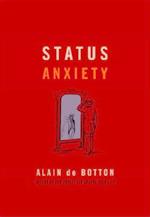Status Anxiety
by Doug French by Doug French
Las Vegas is all about status. The average tourists come here to “get drunk and be somebody,” the country song explains. Those who move here quickly learn that success is often determined by who you know, or who you know who can put in a good word for you. And the rich and famous who come here to see and be seen wake up every day worrying about whether their adoring fans still think them worthy.
 Author Alain de Botton examines the worry that we are not conforming to what society believes success is, in his beautifully written Status Anxiety. In de Botton’s view: “If our position on the ladder [of success] is a matter of such concern, it is because our self-conception is so dependent upon what others make of us. Rare individuals aside (Socrates, Jesus), we rely on signs of respect from the world to feel tolerable to ourselves.”
Author Alain de Botton examines the worry that we are not conforming to what society believes success is, in his beautifully written Status Anxiety. In de Botton’s view: “If our position on the ladder [of success] is a matter of such concern, it is because our self-conception is so dependent upon what others make of us. Rare individuals aside (Socrates, Jesus), we rely on signs of respect from the world to feel tolerable to ourselves.”
The author breaks the book into two major parts, spending roughly a third on the causes of status anxiety and the remaining two-thirds on solutions. He spends much time on expectations as a cause of status anxiety. The industrial revolution brought people in to town from the farm, and, by the late 1800s, “[g]oods and services that had formerly been the exclusive preserve of the elite were made available to the masses. Luxuries became decencies, and decencies necessities,” de Botton writes. That is what capitalism does when left to operate unfettered. But these advances bring with them expectations and the expectations bring on envy and status anxiety.
Alexis de Tocqueville titled a chapter in his seminal Democracy in America, “Why the Americans Are Often So Restless in the Midst of Their Prosperity.” “When inequality is the general rule in society, the greatest inequities attract no attention,” de Tocqueville observed. “But when everything is more or less level, the slightest variation is noticed.”
In his chapter on meritocracy, de Botton makes the trenchant point: “Once the partridge shooters had been ejected from the Civil Service and replaced with the intelligent offspring of the working class, once the SATs had emptied Ivy League universities of the witless sons and daughters of East Coast plutocrats and filled them instead with the hardworking children of shop owners, it became harder to maintain that status was the result entirely of a rigged system.”
Dependence also creates status anxiety, according to de Botton. For many people, their jobs or professions provide them status, respect and care — not to mention ongoing sustenance. And these jobs are dependent upon the profitability of employers and the business cycle.
The author offers up philosophy, art, politics, religion and bohemia as solutions to status anxiety. Ancient Greek philosophers were not worried about status, because they held themselves in such high esteem intellectually. Socrates, according to de Botton, when asked about being insulted in the marketplace, replied, “Why? Do you think I should resent it if an ass had kicked me?” Later in 1851, Arthur Schopenhauer wrote, “Other people’s heads are too wretched a place for true happiness to have a seat.”
Art, both in the written word and paintings, “can challenge society’s normal understanding of who or what matters.” Politics determines status through the prevailing ideology of the day, and religion, through churches and the social framework, serves to place spiritual matters ahead of earthly power.
The final chapter on bohemia focuses on a rather small group that, in the author’s words, “set themselves up as saboteurs of the economic meritocracy to which the early nineteenth century gave birth.” Never mind that many of these bohemians were rich members of the elite.
Henry Thoreau is mentioned as one of the most renowned bohemians. His famous stay at Walden Pond led him to write: “Most of the luxuries, and many of the so-called comforts of life, are not only not indispensable, but positive hindrances to the elevation of mankind.”
 Man has insatiable wants and constantly attempts to improve his lot in life. And for those with no spiritual or philosophical grounding, that means increasing status anxiety.
Man has insatiable wants and constantly attempts to improve his lot in life. And for those with no spiritual or philosophical grounding, that means increasing status anxiety.
“Life seems to be a process of replacing one anxiety with another and substituting one desire for another — which is not to say that we should never strive to overcome any of our anxieties or fulfill any of our desires,” writes de Botton, “but rather to suggest that we should perhaps build into our strivings an awareness of the way our goals promise us a respite and a resolution that they cannot, by definition, deliver.”
This article originally appeared in Liberty Watch Magazine.




